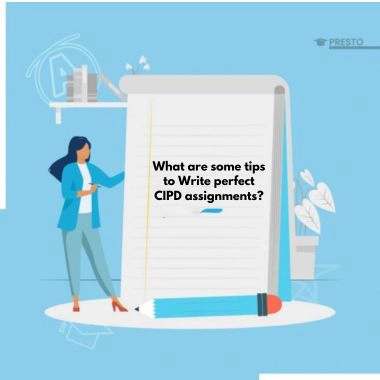If you are studying Human Resources or Learning and Development, you may need to complete CIPD assignments. These assignments are important. They show how well you understand the topics and how you can use what you learn in real life.
Sometimes writing these assignments can feel hard. But do not worry. This guide will give you simple tips to help you write great CIPD assignments step by step.
12 Simple Tips to Write Perfect CIPD Assignments
1. Read the Instructions Carefully
Before you start writing, read all the instructions. Make sure you understand what the question is asking. Some words in the question tell you what to do. For example:
- Explain means to make something clear.
- Compare means to talk about how two things are alike or different.
- Discuss means to give different points of view.
Take notes or highlight the important parts. This will help you stay focused.
2. Learn About the Topic
After reading the question, start learning more about the topic. Use trusted websites like the official CIPD site, your textbooks, or other school materials. You can also use examples from real workplaces to help explain your ideas.
Good research gives you the information you need to write strong answers in your CIPD assignments. If you are not sure what the question means, ask your teacher or look for CIPD Assignment Help online to get a better idea.
3. Make a Simple Plan
Before writing, make a plan or outline. This helps you stay organized. A basic structure looks like this:
- Introduction – Say what your assignment is about
- Main Part – Explain your ideas and give examples
- Conclusion – Summarize what you talked about
- References – List the books and websites you used
Having a clear structure makes your writing easier to follow.
4. Use Real-Life Examples
Try to add real-life examples to your answers. If you have work experience, you can talk about what happened at your job. If not, use a made-up example that could happen at work. For example, if the question is about team building, you can explain a time when your team worked well together or had a problem. Real-life examples make your CIPD assignments more interesting and useful.
5. Think About What You Are Writing
Do not just copy what the book says. Think about it and give your own opinion. Ask yourself:
- Does this idea work well in every company?
- What are the good and bad sides of this method?
- What would I do differently?
When you think deeply, your writing becomes more powerful.
6. Find a Quiet Place to Study
Choose a place where you can focus. Turn off the TV or your phone. Sit at a desk with everything you need. Working in a quiet place helps you think better and write faster. If you study in short blocks of time, like 30 to 45 minutes, you can take small breaks and feel more refreshed.
7. Talk to Others
If you have classmates or teachers, talk to them. Ask questions if you are not sure about something. You can learn a lot by hearing what others think. But remember, always write your assignment in your own words. Copying from someone else is not allowed.
Read Also: Key Tips for CIPD Assignment Success
8. Write Clearly and Neatly
Use simple words and short sentences. Do not use texting language or slang. Make sure your grammar and spelling are correct. Use spell check or tools like Grammarly to help you.
Use headings to keep your writing neat. This helps the teacher or marker read your work easily.
9. Always Add References
If you use information from books or websites, you must say where you found it. This is called a reference. It shows that you did research and helps avoid plagiarism.
For example, if you get an idea from the CIPD website, you should write that source in your reference list.
10. Read and Check Your Work
Before you hand in your assignment, read it again. Look for:
- Spelling mistakes
- Missing words
- Confusing parts
- Any questions you didn’t answer
Reading your work out loud can help you catch mistakes. You can also ask a friend or teacher to read it and give you feedback.
11. Use Plagiarism Checkers
Sometimes we may copy words without meaning to. Use free tools online to check if your writing is original. This helps make sure your CIPD assignments are written in your voice.
12. Ask for Help If You Need It
If you are confused or stuck, ask your teacher or tutor. You can also join online groups where other students share tips and support each other. Getting help does not mean you are weak. It shows you want to learn and do better.
13. Make a Study Plan
Divide your assignment into small tasks. For example:
- 1 Day: Read the question and do research
- 2 Day: Make a plan
- 3–4 Days: Write the first draft
- 5 Day: Check and improve your work
- 6 Day: Add references and submit
Having a plan keeps you calm and helps you finish on time.
Summary
Writing perfect CIPD assignments takes time, effort, and practice. But with the right steps, you can make your writing clear, strong, and ready for success. Remember to understand the question, do your research, plan your ideas, give real-life examples, and check your work before submission. These tips will help you feel more confident and prepared. Keep trying and learning. With each assignment, you will get better and reach your goals.

